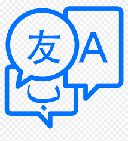-
Blog
-

Integrated Full Package Services
Technical content and patents are mostly presented with tables, graphics, diagrams, non-editable pictures.
-

Artificial Intelligence vs. Human Project Management
Technology is booming and translation industry will be heavily effected out of combined AI and DA solutions.
-

Translation Projects and Challenges
In this article, I would like to share some examples related to the challenges.
-

Upgraded Vendor Management
The world is moving into a new eco-system through faster and extended connectivity
-

Broader Interpretation of “Pro Level”
Broader Interpretation of “Professional Level” Could Be A Problem
-

Customer Support
Learn why it's crucial for language service providers (LSPs) to take responsibility for their mistakes and provide free-of-charge solutions.
View All
-
-
Our Services
-

Project Management
Since 2002 we streamline workflows, vendors & deadlines for flawless multilingual delivery
-

Terminology Management
Build & enforce domain glossaries for brand-safe, term-accurate translations
-

Quality Assurance
Human + AI checks guarantee accuracy, cultural fit and ISO-level quality
-

Enterprise Solutions
Centralized, API-driven translation programs that scale with global brands
-

Translation by Experts
Certified native linguists handle sensitive texts with expertise

Web / Apps / Games Localizations
Adapt UI, SEO and UX for target markets to boost traffic

Interpretation
On-demand video & phone interpreters in 40 + languages

Al-powered translation
Fast, cost-efficient and premium

Multimedia
Translate, sync and deliver captions or dubs

Specialized Postediting
Expert editors review and verify

Languages
100 languages globally are covered

Desktop Publishing
Re-layout text & graphics so translations fit perfectly
-
-
Industries
-

Translation Services for Every Industry
Which Industries Most Rely Upon Language and Translation Services
-

Industrial
User manuals and operating instructions, product specifications, service, maintenance and policy manuals, technical database etc.
-

Products
User manuals, product descriptions, troubleshooting, technology, installation guides, safety rules, disposal, electrical hazards, frequently asked questions etc.
-

Research
Market research, industrial research, advertisement research, political research, internet research, scientific research etc.
-

Media
Published media, digital media, social media, marketing media, interactive media, broadcasting media, corporate bulletins etc.
-

Government & NGO
Tenders, technical and administrative specifications, application documents, official papers, environmental policy, resource management, social science etc.
-

Legal
Contracts, agreements, law, code, bylaws, decrees, statute, regulations, court decisions, letter of attorney, proxy, signatory circular etc.
-

Financial
Financial statements, banking documents, letter of credit, insurance policy, bank statements, stock market insights and financial analysis etc.
-

Healthcare
Clinical studies, trials, pharmaceutical guidelines, life sciences, description and use of surgical and other medical instruments and devices, dosage/use instructions etc.
-

Hospitality
Tour and holiday guides, brochures, hotel and holiday village documentations, online selling platforms, customer feedback and surveys, restaurant menus etc.
-

Your Industry
Categories are interrelated and more complex than simplified above. We’d be happy to to assist you with contents that may not be numerated here.
-
-
Get Quote
-

Get an Instant Quote
To obtain a prompt and straightforward quote for translation or other language services, please fill out this form and attach your source files or samples, along with any instructions you may have.
-

Quote for Cost Optimization
If you have a complex project and would like to provide additional information to receive a more optimized quote, please utilize this form to submit your instructions, along with source files, references, glossary, translation memory, and any other relevant materials.
-

Quote for Interpretation
To book professional simultaneous or consecutive interpreters, use this form to send the details such as languages, venue, type of interpreting etc. to speed up the quotation process.
-
- Contact Us
-
Vendors






